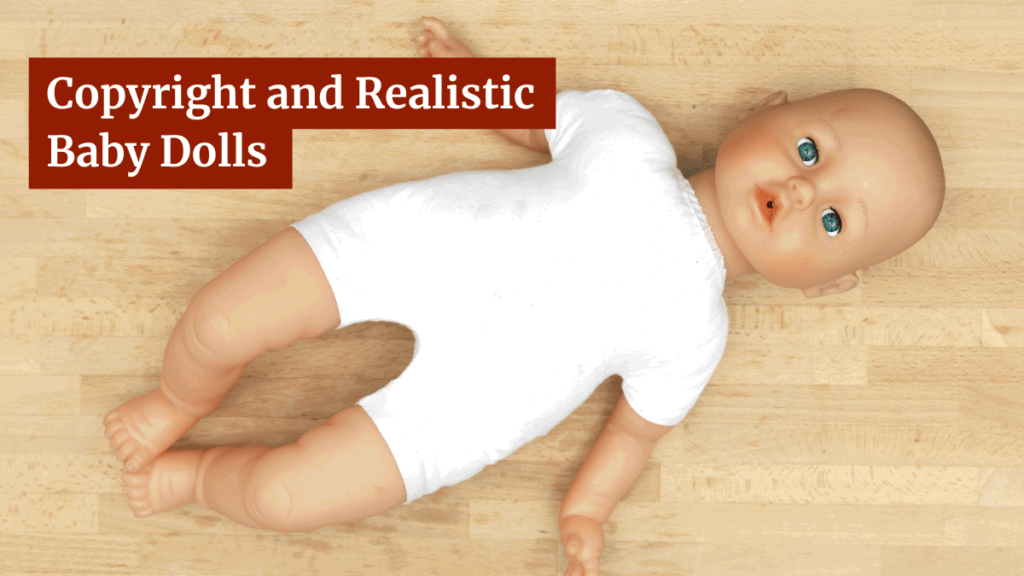
In a Utah district court, Judge David Barlow has ruled in favor of DP Creations LLC, better known as Bountiful Baby, in their lawsuit against two counterfeit manufacturers.
The case is somewhat unusual due to the nature of Bountiful Baby’s product. The company makes and sells hyper-realistic baby doll parts, which the company has registered as individual sculptures.
Though the ruling is a default judgment, the judge examined the facts of the case very closely and even tossed two of the alleged infringements. Ultimately, he awarded Bountiful Baby $600,000 in damages and $52,477 in attorney’s fees and costs.
It’s an interesting case that examines an infringement of works that enjoy very limited and thin copyright protection. With a few minor changes, it’s easy to see how this case could have gone very differently for the plaintiffs.
In that regard, this is a warning to creators of similar products to ensure that a similar product is an infringement before filing any legal action.
Background of the Case
Bountiful Baby filed the case in March 2022. Initially, the case targeted five separate entities: Adolly.com (ADC), Adolly US (AUS), OtardDolls (OTD), Reborn Doll Gallery (RDG) and NPK.
The plaintiff claimed that the four entities were making and selling counterfeit versions of their doll pieces. The only difference between them was the number of works they allegedly infringed.
Initially, the court found that it did not have jurisdiction over AUS and RDG. The claims against the other three moved forward on a separate path. Meanwhile, Bountiful Baby appealed the jurisdiction issue to the 10th Circuit Court of Appeals, which overturned the lower court decision.
Since neither AUS nor RDG participated in the lawsuit, Bountiful Baby moved for summary judgment against them.
To that end, Bountiful Baby alleged that AUS and RDG infringed seven and three sculptures, respectively. Each sculpture represented one baby part, including three heads, two sets of arms and two sets of legs. Since the parts were registered and sold separately, the judge treated each item as a separate work for the purpose of analysis and damages.
The judge then analyzed the alleged infringements and found that all but two items (one set of arms and one set of legs) were direct copies of Bountiful Baby’s creations. As such, he ruled that AUS had infringed five items and RDG had infringed three.
The judge then granted a permanent injunction against both AUS and RDG and awarded $450,000 and $150,000 in damages, respectively. The judge also ordered AUS, RDG, and the other defendants to pay $52,477.59 in attorney’s fees and costs.
All in all, it was a significant win for Bountiful Baby, who got nearly everything that they wanted.
Thin Copyright, Big Protection
This isn’t Bountiful Baby’s first lawsuit. The company has filed at least two other lawsuits targeting counterfeiters and, overall, seems to have done well with them.
But what makes them unusual is the nature of their product. They are best known for the Realborn line of dolls, created from 3D scans of actual infants. Since one can’t hold the copyright to a baby or even the idea of creating lifelike dolls, their copyright is limited to their specific scans and specific products.
That came through strongly in this case. The judge analyzed each of the alleged infringements, looking at proportions, positioning, lines/wrinkles and other tiny details to determine whether they were exact copies of Bountiful Baby’s work or just very similar.
Ultimately, the judge found that all but two items were identical. Those two, a pair of arms and legs, the judge noted the differences, including the angle of the joints.
However, this is why Bountiful Baby has had so much success. Counterfeiters aren’t content just using the name and creating a similar but inferior product. They make direct copies.
Usually, a product like this would struggle to enjoy any significant copyright protection. But the nature of the infringement opened the door for Bountiful Baby, and they seem to have used it to their advantage.
Bottom Line
The case is an interesting example of how even a thin copyright can be enforced if the infringement is close enough. Though Bountiful Baby can’t copyright the idea of a baby, a baby doll or even the concept of a realistic baby doll, it can and does protect its specific creations.
Though others do similar works that are not infringing, the company has targeted counterfeiters making exact copies of their work.
All in all, it’s a positive reminder to always consider what elements of your work can be protected. Copyright is not a magical tool that protects every aspect of your creation. It cannot protect your ideas, just the expression thereof and what is uniquely yours in that expression.
Bountiful Baby seems to have found a good balance. Hopefully, it will pay off in the long run.
Note: The baby doll featured in the header is (obviously) NOT a Bountiful Baby. I opted for a generic image since many, including myself, are uncomfortable looking at realistic baby dolls.
default-judgment-awarded-to-utah-reborn-doll-maker
Want to Reuse or Republish this Content?
If you want to feature this article in your site, classroom or elsewhere, just let us know! We usually grant permission within 24 hours.
